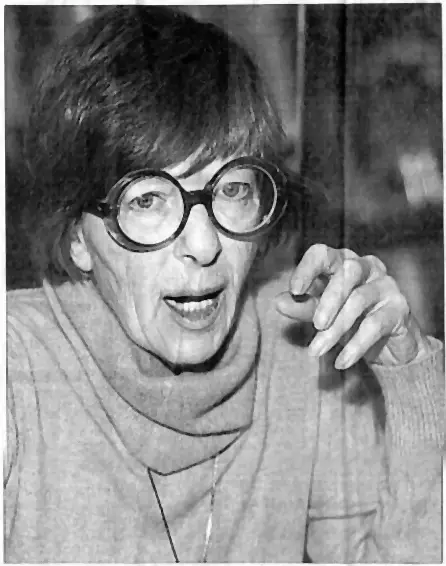The girls are besieged by Hanff manques…
“Helene Hanff is dead, isn’t she?” Tab, one half of the ownership of Circle in the Square Books glanced toward someone just out of range of the cam on her laptop and then stared back at me. “I will pay you any amount of money as long as it’s not more than twenty-five dollars to find her and drive a stake through her heart.”
I did a quick check on Wikipedia.
“She died in 1997. I doubt if there’s much left to stake. Why the hatred for a dead writer?”
Sam leaned into the picture, pointed to her left and made a “use your inside voice” gesture.
“The Methodist Ladies Book Club just read ’84 Charing Cross Road’ and ‘The Duchess of Bloomsbury Street’.” Sam kept her voice soft and low. “Most of them have been channeling Helene for the past week.” She gave a hapless shrug.
Tab shook her head. “They’re. So. MEAN!”
Sam shushed her.
“They cant be that bad,” I said.
Just then, a customer tossed a paperback on the counter. “You call this a good edition of ‘Stella Bain’? Look at the foxing!”
Sam picked up the book and looked it over. “I don’t see any foxing. In fact, this book is brand new. Would you show me where the foxing is?”
The woman hesitated. “Erm, I’ll give you a dollar for it.”
Sam shook her head. “Sorry. I’ll have to pass on that offer.”
The woman stood for a second, snorted, and walked out.
“Welcome to our world.” Sam smiled ruefully while Tab rolled her eyes and sighed. Sam turned to her, “At least she didn’t try to be funny.”
Was she really THAT bad?
I was only too used to would-be comedians who tried way too hard and felt the girls’ pain. It was easy to imagine the book club reading Hanff’s epistolary tale and feeling the need to capture a bit of the sardonic tone she used when chiding the bookstore personnel for not quite meeting her standards. To be fair, Hanff took them to heart as a literary family by choice. I remembered her as a gruff, cranky mensch who learned about their lives, sent gifts, and remembered birthdays. Was I looking at our Helene through the misty water-colored memories of a book I hadn’t picked up in nearly three decades? Maybe it was time to revisit Hanff’s slim bits of literary romance.
I’m sure Hanff figured she came off as a cuddly crank of a lady. There were indications of heart, but my goodness, so much…muchness. The mental image of her chuckling at her latest bon mots and the clerks flinching every time they saw a New York postmark kept popping into my head as I read.
I gave my borrowed copies back to the high school speech teacher who’d loaned them to me.
“They’re not something I bring out as a regular part of the curriculum,” he said. “I’ll tell you when they come in handy. When we’re working on theatre projects and a student is squeamish about making a character unlikeable. She’s really transparent about what makes her tick, personality wise. Helene Hanff liked herself. A lot. Nothing wrong with that, but when you see that she often chose being clever over being kind, it makes a good character study for budding actors and directors. And when I can get a student to tap into that and convey it to an audience, well, that’s when they have a creative breakthrough.
I told him about the reading group in Mississippi. He shook his head. Nope. He just couldn’t handle eleven Helene Hanffs demanding service.
Yeah, well, maybe she was just… No. She was a crank.
My initial thought was that this was simply a literary persona who hadn’t aged particularly well. Then again, she does fit in quite well with net culture. The postal snark, the flouncing, the pitched hissy fit at her hosts when she finally does get to visit England are a precursor to the digital courage the cover afforded the denizens of the internet.
When I started asking about Hanff’s books, those who read them were divided between people who fondly remembered the literary romance and those who just could not deal with Hanff as she wrote herself. Yet some of these same people had no problem enjoying the exploits of E. F. Benson’s comically pretentious Mapp and Lucia.
Maybe it’s the perceived intention. Reading Hanff can have the same effect as watching someone give a cashier or a waiter a hard time and then have them turn to you and wink as if to pull you into what they see as screamingly funny behavior that makes you want to scream and run.
It could also be a function of the comfort of fictive distance. We know Mapp and Lucia are figments of Benson’s imagination. While we might recognize aspects of their outlandish behavior in ourselves or people we know, there is the reassurance we give ourselves that we can cringe and laugh because they are not real. Hanff, on the other hand, was all too real. Given the tenor of what she wrote, it would be safe to say that what what you saw was what you got. There is something uncomfortable about real life curmudgeons. At first blush, we might admire their cleverness, but in time we begin to feel worn out by writers like Hanff and her sister under the skin, Dorothy Parker. We need some vitamin C to go with all of that earthy, saturnine substance or we run the risk of suffering from literary scurvy.

